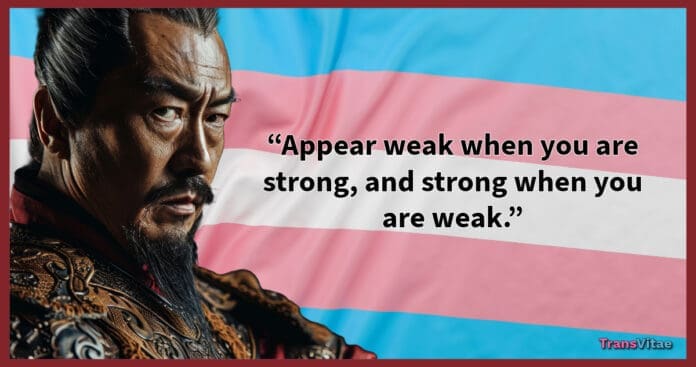Trans Tactics: Sun Tzu’s Guide to Defending Our Lives: Part 3
“Appear weak when you are strong, and strong when you are weak.” — Sun Tzu, The Art of War
Advocacy isn’t always about having the biggest crowd or the loudest voice. Sometimes, it’s about shaping how others see you, choosing what to reveal and what to hold back. In the fight for trans rights, that’s not deceit. It’s survival.
Sun Tzu knew that power wasn’t just about swords or armies; it was about perception. And in a world where trans lives are constantly scrutinized, perception can be everything.
Why Perception Matters
Trans people are often forced to navigate a world of double standards. We’re seen as either too visible or too hidden, too loud or too silent, too strong or too vulnerable. This isn’t paranoia; it’s the tightrope we’re expected to walk.
But what if we stopped playing by those rules?
What if we recognized that shaping how we’re seen can be a form of power?
When to Appear Strong
There are moments when trans people and trans advocates need to show up with undeniable strength. It’s not about aggression. It’s about conviction.
- When lawmakers hold hearings on bills meant to erase us, showing up in force, testimony, presence, and unity show we won’t be erased without a fight.
- When media outlets spread disinformation, a calm, firm voice counters the chaos.
- When allies ask how to help, your confidence in your identity sets the tone.
Appearing strong doesn’t mean being invulnerable. It means showing that your humanity and your rights are not up for debate.
Example: Mutual Aid and Solidarity
Trans mutual aid networks, those quiet, grassroots efforts, often appear as acts of compassion and support. But they’re also acts of strength. They’re a collective “no” to the idea that trans people are alone or disposable.
When to Appear Weak
Sometimes, vulnerability is just as powerful. It’s not about surrender; it’s about connection.
- When you share your personal story, you make it harder for the opposition to reduce you to a talking point.
- When you admit uncertainty or fear, it invites empathy instead of defensiveness.
- When you show the human cost of anti-trans policies, it reframes the conversation from abstract debates to real lives.
Appearing weak doesn’t mean you are weak. It means you’re strong enough to be seen fully.
Example: Testimony That Moves Hearts
At legislative hearings, many trans people share their stories, not because they’re begging for mercy, but because those stories move hearts in ways no fact sheet can. Vulnerability breaks down defenses. It’s an invitation to see us as human.
Managing Perception in Media & Online Spaces
In the digital age, how you present yourself can shape entire conversations. That doesn’t mean you owe anyone a performance, it means you have the right to choose how you show up.
Tips for controlling perception online:
- Stay grounded. Don’t let trolls define the debate; speak to those who want to understand.
- Use boundaries. You’re not obligated to share every part of yourself.
- Prioritize your safety. Never trade your well-being for “visibility points.”
Balancing Strength and Vulnerability
You don’t have to choose one or the other. Sun Tzu’s lesson was about fluidity, knowing when to stand firm and when to reveal your humanity.
For trans people, that balance is revolutionary. This means that I am not here to showcase my suffering for your benefit. I am here to exist, fully and unapologetically.
Ally Action: Read the Room, Don’t Steal the Spotlight
Allies, here’s your play:
- Learn when to amplify trans voices, and when to step back.
- Don’t confuse performative allyship (like rainbow logos) with real support.
- Please demonstrate your vulnerability by acknowledging when you are learning and taking responsibility for any mistakes.
When trans people are targeted, your strength helps. When we’re thriving, your celebration matters. Learn to read that room.
The Bottom Line
Sun Tzu wasn’t talking about TikTok algorithms or legislative hearings. But his wisdom still applies.
In the end, appearing strong or weak isn’t about playing a role; it’s about refusing to be flattened into a stereotype.
Because the world will keep trying to define us. But when we shape how we’re seen, when we claim the right to be messy, complex, and real, we’re already winning.
Next Up: “Strategic Deception: Control the Narrative in Hostile Climates”
Dropping June 10. Only on TransVitae.com


